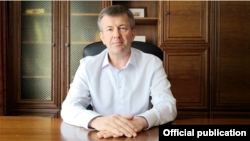A Belarusian diplomat who resigned after he openly supported ongoing protests against official results of the August 9 presidential poll that handed victory to incumbent Alyaksandr Lukashenka says the uprising occurred for the simple reason that people are tired of having their votes "ignored."
Ihar Lyashchenya resigned as the ambassador to Slovakia on August 18, two days after he publicly supported the anti-Lukashenka rallies across Belarus.
Lyashchenya, who is currently back in Minsk, told Current Time on September 4 that the situation in Belarus was "specific," as the Belarusian "people have been brought to a state where they were ready to vote for any" candidates opposing Lukashenka.
Protesters in Belarus insist that the official results -- which gave Lukashenka just over 80 percent of the vote -- were rigged and that Svyatlana Tsikhanouskaya, who is currently in Lithuania, in fact won the election.
"People were voting for candidates without knowing their programs. Tsikhanouskaya's program was 'I will organize a new election.' That was it. And, of course, there were no clear leaders," Lyashchenya said.
"People were against the cheating, against the fact that their votes were ignored. People were angry with lawlessness," he added. "We are talking about people's demands for basic political freedoms."
Lyashchenya also expressed hope that Lukashenka, who has garnered the support of Russian President Vladimir Putin amid domestic and international pressure over the crackdown on protests, "will not sign some far-reaching" deals with the Kremlin.
Lukashenka, who has run the country since 1994, for many years managed to skillfully maneuver between Moscow and the West, also welcoming Chinese influence and investment in recent years as a buffer to Russian influence.
The postelection protests came amid a period of heightened tensions between Minsk and Moscow over Russian loans, subsidized energy, and Kremlin efforts to further integrate Belarus through a union-state treaty signed in the 1990s.
While Putin did congratulate Lukashenka on a "victory" at the polls, his statement implied conditions for Russian support, and Moscow is looking for ways to gain leverage over a weakened Lukashenka who is desperate for help.
Lyashchenya told Current Time that he thinks that the agenda of the Lukashenka-Putin deal most likely includes nothing more than "political support, some sort of economic support, maybe, some preferences in the current circumstances."
Lyashchenya added that he decided to return to Belarus, although Slovakia's government was open to offering him political asylum.
"My children, my parents are in Belarus and I must be in Belarus. That is why I returned," Lyashchenya said from his summer house near Minsk via Skype.





Facebook Forum